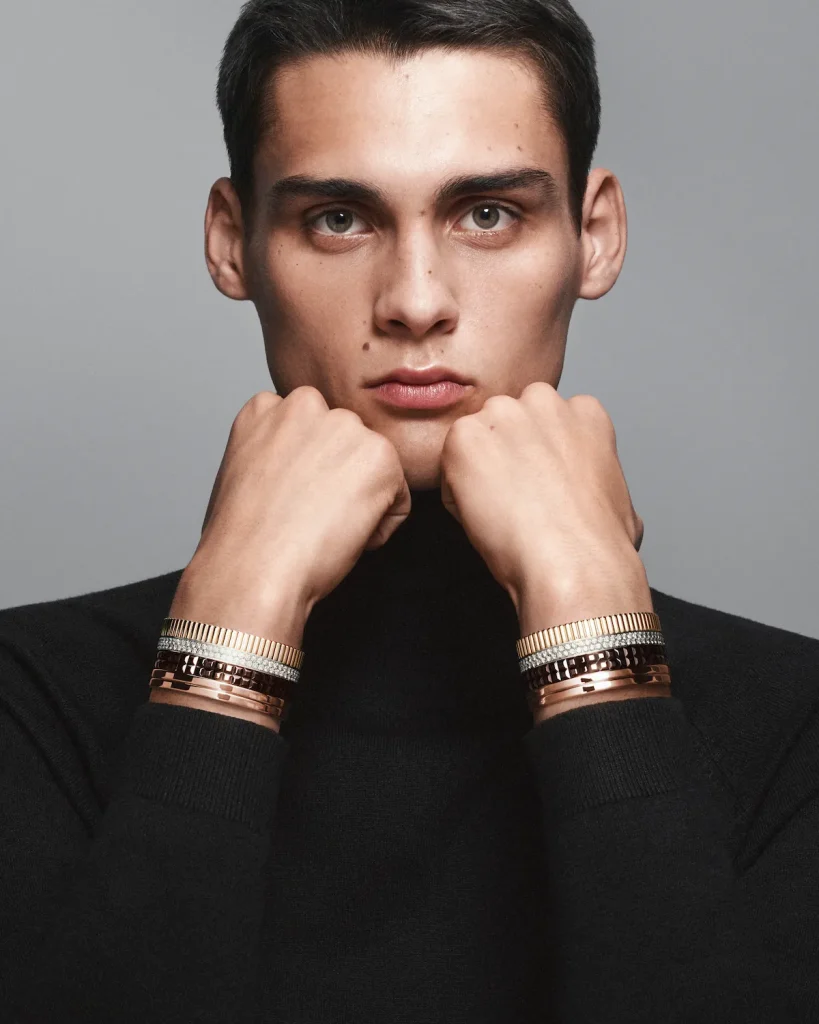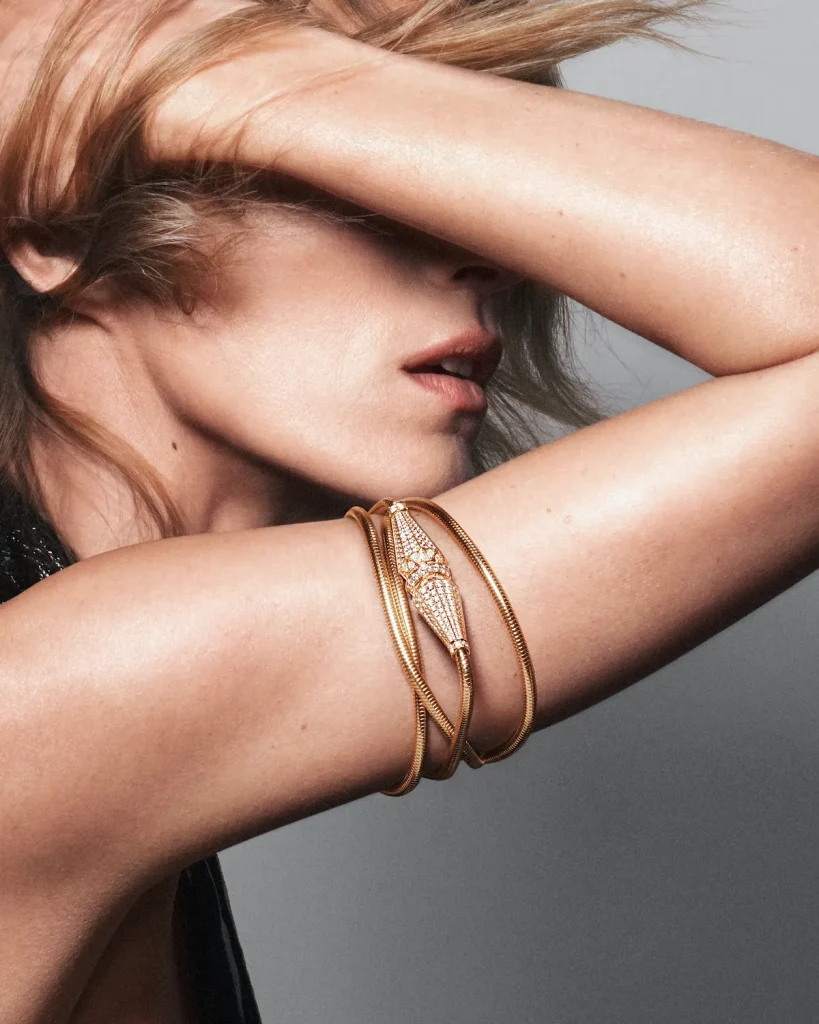In its second-ever sustainability Impact Report, luxury jewelry label Boucheron shows significant progress.
“Sustainability is not just a buzzword for me,” Boucheron CEO Hélène Poulit-Duquesne wrote in a LinkedIn post accompanying the French jewelry label’s 2023 Impact Report. She continues, “It is a core value that drives every decision at Boucheron. It is crucial to not just claim our commitment but to lay bare our practices. On this journey towards a more sustainable future, transparency and progress remain our guiding lights.”
The 56-page Impact Report is Boucheron’s second, highlighting the label’s actions across 3 key pillars: responsibly sourcing raw materials, optimizing our operations, and ensuring an inclusive and a diverse workplace. “More than a documentation, this report was an opportunity to share our successes and acknowledge the road ahead,” says Poulit-Duquesne.
The report notes that Boucheron’s Environmental Profit and Loss (EP&L) intensity has decreased by 48 percent between 2015 and 2022 with its goal now to conduct deep trajectory analysis and define new
ambitious targets for 2025, 2030, and 2050.

The French jewelry label, part of the Kering conglomerate, says by 2025 it’s aiming for several significant benchmark achievements, including 100 percent traceability on key raw materials as well as a 40 percent reduction of its environmental footprint and a 90 percent inclusion index score.
“To preserve what is precious, our supply chain needs to be transparent,” reads the report. “By going to the source, we can make sure that the metals and natural stones that we use have a positive impact at every step of the journey — and that we can support resilience in our sourcing communities and the environment. We collaborate with suppliers and peers to create the industry-wide change that is needed.”
According to the report, by 2025, 100 percent of its strategic suppliers will align with its highest sustainability standards and the Kering Code of Ethics. The suppliers must also meet the Kering Standards for Raw Materials and Manufacturing Processes, the Responsible Jewelry Council (RJC) Code of Practice and Chain Of Custody, The OECD Due Diligence Guidance for Responsible Supply Chains of
Minerals from Conflict-Affected and High-Risk Areas, and The Kimberley Process.
In 2022, about 95 percent of the gold used in Boucheron pieces was recycled. The label says its recycled gold comes from selected refineries that adhere to the Kering Ethical Gold Framework and certified RJC Chain of Custody. Kering also ensures refineries are audited on Business Ethics subjects. The remaining gold used comes from “selected verified, small-scale artisanal mines,” which Boucheron says are either certified FairTrade, FairMined, or RJC CoC, or artisanal mines that meet Kering’s strict ethical and environmental standards.
“We purposefully maintain a portion of extracted gold with full traceability to proactively support responsible practice in the gold industry,” reads the report. Boucheron notes that approximately 20 million people worldwide are engaged in artisanal and small-scale gold mining. “Sourcing gold from these selected small mines can improve and help drive positive practices in gold mining, such as ensuring that all operations are mercury-free (or, as a transition, with responsible and controlled usage of chemicals), water is used responsibly (closed water circuit to drastically reduce water usage) and health and safety precautions are rigorously observed.”

Since 2018, one percent of Boucheron gold purchases go toward funding responsibly mined gold and extraction mitigation initiatives. As of 2021, fewer than 30 mines in the world were certified FairMined or FairTrade. “We believe that supporting responsible practice in these artisanal mines is key as they provide vital jobs, and properly managed mining can generate responsible development for the mining communities,” Boucheron says. The label also announced the establishment of the Boucheron Fund for Education to support community development and climate resilience in mining communities, supporting 50,000 children annually by 2030.
Diamond traceability is also a focus for the label. “Since 2016, we have been working toward achieving full traceability of all our diamonds by 2025, and we are committed to obtaining accountability for our entire value chain, from mine to workshop,” reads the report. “We know that complete confidence in this traceability is the way to be clear that our sustainability standards are met by our partners every step of the way – this then gives us the choice to work with partners to improve practices or to source from others.”
This last year saw Boucheron along with Kering and its Maisons, support a women’s empowerment project in Ghana “to enhance women’s visibility, autonomy, and economic independence by increasing women’s access to credit to engage in economic opportunities in and around the mines.” The label is working with a local Civil Society Organization, Solidaridad West Africa, to economically empower women in mining communities to advocate for responsible mining especially the use of mercury.

“Up to 50 percent of the artisanal and small-scale gold mining workforce is women,” reads the report. “Unfortunately, the needs of women on sites and within the communities are often ignored. Our engagement with Solidaridad is therefore key to creating positive change.”
Boucheron says it’s working on sourcing 100 percent renewable electricity for its operations and for its strategic manufacturing suppliers. It will also work to halve the environmental footprint from packaging
by 2025 and eliminate single-use plastic packaging.
This year also saw the label launch “No Pack is The New Pack” — a plastic-free jewelry case aimed to reduce waste. It’s made from aluminum, with 15 to 20 percent recycled metal, and wool that Poulit-Duquesne says is certified by the Responsible Wool Standard. While wool is a biodegradable material, it’s still a highly controversial material as sheep are leading producers of methane emissions driving climate change. Wool also has ethical implications over the treatment of sheep, namely the contentious practice of mulesing. The new case weighs 75 percent less than the prior case, says Poulit-Duquesne.
“At Boucheron, we are not just pushing the boundaries of the industry,” wrote Poulit-Duquesne, “we are shaping a future where creativity and sustainability walk hand in hand.”
Related on Ethos:


